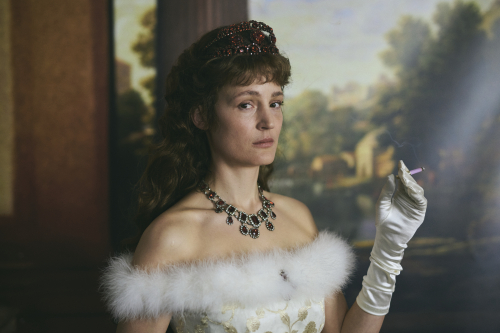
Felix Vratny/IFC Films
MOVIE REVIEW
Corsage (2022)
Early on there’s a slow-motion shot of Empress Elisabeth of Austria (Vicky Krieps) and her three ladies-in-waiting (Jeanne Werner, Alma Hasun and Katharina Lorenz) running up some palace stairs. The shot is slow-motion to allow the audience to realize that they filmed in the actual palace without bothering to cover up the modern trappings of the museum it has become, to the point there’s a uniformed guard in a glass ticket booth by the door. This jarring choice by writer-director Marie Kreutzer might have been an inevitable budgetary consequence – they could shoot in the genuine historical locations, or in perfectly accurate period settings, but not both – but it turns the heart of the film away from Elisabeth into the conflict we have when assessing a real historical figure with modern eyes.
Elisabeth herself is ripe for modern reassessment, which is obviously why the film was chosen for the Toronto International Film Festival. She was famous for her body, with a small waist, tightly corseted figure (the corsage referenced in the title) and incredibly long, elaborately styled hair. Despite all the beautiful food offered her at her pleasure, she fasts to maintain her figure and undertakes a daily robust program of exercise. At one point she was obviously fun, as her anchor tattoo makes clear; and her marriage to the Emperor Franz Joseph (Florian Teichtmeister) used to be happy, but his relentless focus on his duties, as well as the loss of one of their children, has soured the air between them. When, after a frightening fall from a horse, Franz Joseph is welcomed into Elisabeth’s bedroom by some startling nudity, he merely remarks how pleased he is she was not injured by her fall. (His excellent mutton chops are also fake, glued on whenever he goes out for state events.) Later Elisabeth takes herself to her private farm in the north of England, where she allows herself to be filmed by the “father of cinematography” Louis Le Prince (Finnegan Oldfield) and toys with the affections of her private riding coach, Bay Middleton (Colin Morgan). Apparently all she wants, instead of the empire which is at her disposal, is to be thought of as the most beautiful woman in the world. That is what turns her on and matters to her more to her than anything.
Or does it? Upon her return from the holiday on the farm, she begins to be openly disdainful and disrespectful of the regal life she has to lead. Her adult son, the empire’s heir, Rudi (Aaron Friesz), takes it upon himself to have a word, which goes about as well as you’d expect. And it’s here that the movie twists away from being a regular biopic into something stranger and less effective. Kirsten Dunst famously said about “Marie Antoinette” that it was a biography of feelings, not facts, which seems to have been Ms. Kreutzer’s inspiration. Except, by the end, there’s no relation to any actual facts of Elisabeth’s life, and with the modern twists, she goes fast and loose with the feelings, too.
The poster image of Elisabeth flipping the bird makes this distastefully clear, but it’s also not a true match to the movie’s overall tone, which starts out with great sincerity before giving up the ghost. Even still, there is no actress alive who would have turned down this part, even as the movie warps into a fantasy of . . . escape? Freedom? Childish rebellion? Ms. Krieps projects a cool sense of her own power, speaks four languages – German, English, French and Hungarian – plays the piano herself and gets to demonstrate much of Elisabeth’s exercise regime, though the scenes where she and Mr. Teuchtmeister argue during fencing lessons are much too literal to be amusing. But the choices Elisabeth makes require the collusion and sacrifice of her ladies, so the ending is not exactly the feminist rallying cry you might hope for. It’s been a long time since any film, much less one purporting to be a historical biopic of any kind, has lost its way so thoroughly. Are we meant to reject the idea of historical movies altogether, or the idea that we can ever understand a mind from an earlier time? Ms. Kreutzer doesn’t seem to know, which means that unfortunately the movie doesn’t either, making the entire exercise a beautiful waste of time.
Comments